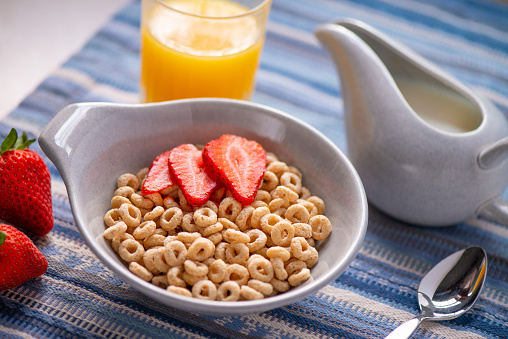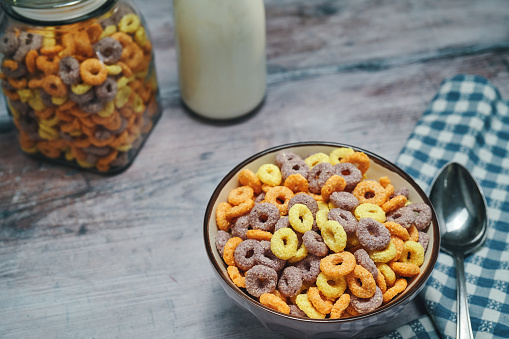Are you looking for a nutrient-packed cereal to satisfy your hunger and help you start your day right? Cheerios may be an excellent option. Although the original version of this classic breakfast food has changed over the years, many people still consider it a healthy choice.
We'll look in-depth at whether Cheerios is truly good for you—and what makes it stand out from other cereals. Let's get started by exploring how Cheerios has evolved throughout its history.
Cheerios

Cheerios are a popular, toasted oat cereal made by General Mills. The original flavor is oats, sugar, salt, vitamins, and minerals. It contains more than ten essential nutrients, including calcium, vitamin D, and iron.
Cheerios also contain whole grains, which may help reduce the risk of heart disease and type 2 diabetes. One cup of Cheerios has only 100 calories—so it's not too high in calories or fat.
Benefits associated with eating Cheerios

Eating Cheerios regularly may provide several potential health benefits.
- May Reduce Cholesterol: Oats, which make up most of Cheerios, contain a type of fiber called beta-glucan that can help reduce cholesterol levels and improve heart health.
- Contains Whole Grains: Cheerios provides dietary fiber and important minerals such as iron, magnesium, and selenium that your body needs for optimal well-being.
- Helps Manage Blood Sugar Levels: Eating whole grains such as those found in Cheerios can help regulate blood sugar levels and reduce the risk of type 2 diabetes.
- High in Vitamins & Minerals: The vitamins and minerals in Cheerios provide essential nutrients for your body.
- May Support Digestion: Cheerios contain dietary fiber, which can help keep you regular and support digestive health.
- High in Protein: Cheerios provide 4–5 grams of protein per serving, more than many other breakfast bowls of cereal.
- Low in Calories & Fat: One cup of Cheerios contains only 100 calories and 0–1 gram of fat, making it an excellent choice for weight management or those watching their calorie intake. 8. May Help With Weight Management: Eating whole grains like oats have been associated with improved weight management and reduced risk of obesity due to its potential effects on satiety (feeling full).
Different kinds of Cheerios and their nutritional differences
To the original flavor, several other varieties of Cheerios offer different nutritional benefits.
- Multi-Grain Cheerios: This version contains five grains (wheat, oats, corn, barley, and rye) and provides 6 grams of dietary fiber per serving.
- Gluten-Free Honey Nut Cheerios: Made with chickpeas, quinoa, and flaxseeds instead of wheat or oats, this cereal is still a good source of dietary fiber, with 3.5 grams per serving.
- Organic Cheerios: This variety is made without synthetic pesticides or genetically engineered ingredients and has no added sugar or salt—making it an excellent choice for those looking for an even healthier option.
- Frosted Cheerios: Although this version contains added sugar, it still provides 3 grams of dietary fiber and 4–5 grams of protein per serving.
Cheerios is a nutritious cereal with several potential health benefits when eaten in moderation. It's made with whole grains and fortified with vitamins and minerals to help you get the nutrition your body needs. There are many varieties to choose from—allowing you to find one that best suits your nutritional needs. Whatever type you decide on, incorporating this classic breakfast food into your diet may give you an extra energy boost throughout the day.
How to incorporate Cheerios into your diet for maximum nutrition
Here are a few tips to help you incorporate Cheerios into your diet for maximum nutrition:
- Start your day with a bowl of Cheerios: Eating Cheerios for breakfast can help set the tone for a healthy day by providing essential vitamins, minerals, and fiber. Top your cereal with fresh fruit or nuts for an added boost of antioxidants and protein.
- Add Cheerios to yogurt or oatmeal: Incorporating Cheerios into yogurt or oatmeal is an easy way to give your dishes an extra crunch while adding nutrients and flavor.
- Make healthier snacks with Cheerios: Instead of reaching for processed snacks, try making healthier options with Cheerios like trail mix, cereal bars, or even muffins.
- Create a healthier version of your favorite desserts: Cheerios can be added to almost any dessert recipe to boost whole grains and fiber. Add them to cookies, brownies, and cakes to give your treat a nutritious twist.
- Use Cheerios as breading for meats: Coating meats with Cheerios provides additional flavor and crunch while reducing the number of unhealthy fats used in traditional breading recipes.
- Incorporate them into salads: Adding some crushed-up Cheerios to your salad gives it a crunchy texture and valuable nutrients like iron, magnesium, and selenium, essential for proper body functioning.
- Use Cheerios as a topping for soups and stews: Adding crushed-up pieces of Cheerios to your favorite hot dishes provides an added crunch, as well as extra fiber and protein to keep you feeling fuller longer.
- Mix them into your morning smoothie: Try blending some of your favorite Cheerios into your morning smoothie to boost whole grains, vitamins, minerals, and other essential nutrients that can help you start the day right.
- Add them to trail mixes or snack mixes: Incorporating Cheerios into your favorite trail mix or snack mix recipes adds flavor while also providing additional nutrients without increasing calories or fat content significantly.
Alternatives to Cheerios that offer the same health benefits
If you're looking for alternatives to Cheerios that offer the same health benefits, here are a few options:
• Kashi Heart To Heart Warm Cinnamon Oat Cereal: This cereal contains 10 grams of dietary fiber per serving and is low in fat, sodium, and cholesterol. It's also made with whole grains like wheat and oats that provide essential vitamins and minerals.
• Nature's Path Organic Flax Plus Multibran Flakes: This cereal provides 7 grams of dietary fiber per serving and is also a good source of omega-3 fatty acids. It's made with organic flaxseed meal, wheat bran, oat bran, and rye flour.
• Quaker Oats Old Fashioned Oatmeal: This classic breakfast option provides 4 grams of dietary fiber per serving. It's also made with whole grains, providing essential vitamins and minerals like magnesium, phosphorus, and zinc.
• Barbara's Kind Cereal Apple Cinnamon Puffins: This cereal contains 5 grams of dietary fiber per serving and is low in cholesterol, fat, and sodium. It's made with gluten-free oats, wheat bran, and rice flour for a tasty breakfast.
FAQS
Is it OK to eat Cheerios every day?
Yes, it is generally safe to eat Cheerios daily. However, as with any food, moderation is key. Eating too many Cheerios can lead to an increase in your calorie intake and could have negative impacts on your health if not balanced with other nutritious foods and regular exercise.
Do Cheerios have sugar?
Yes, Cheerios contain sugar. However, the amount of sugar in a serving of Cheerios is relatively low compared to other breakfast cereals. A one-cup serving of Cheerios contains only 1 gram of sugar.
Are Cheerios halal?
Yes, Cheerios are halal. The ingredients used to make Cheerios meet the standards for halal food as defined by Islamic law and do not contain any pork products or alcohol.
Conclusion
Cheerios are a preferred breakfast cereal choice among many people and offer a high-fiber and low-calorie option. However, it is important to note that one must thoroughly read the nutrition label before consuming the cereal. With so many variations of Cheerios available on the market, depending on what type you choose will affect their overall health properties and nutritional benefits.

What is a Gastroenterologist
Apr 18, 2023

How to Get Rid of Fluid on The Knee
Jul 30, 2023

Be sure you're getting the right heart rate monitor for your needs. Learn best practices and what to look out for with our definitive guide on buying a quality fitness device.
Apr 13, 2023

Benefits of Moringa
Jul 30, 2023

Lean Protein Foods
Apr 25, 2023

What Are Goji Berries
Apr 18, 2023

Recognizing Prediabetes: Symptoms and Early Warning Signs
Aug 03, 2023

How Long Does Vertigo Last
Jul 30, 2023

What is Neuralgia
Apr 20, 2023

Ways to Get Rid of Bloating
Apr 30, 2023

Benefits of Lemon Balm
Apr 25, 2023

Benefits of Pomegranate
Apr 24, 2023